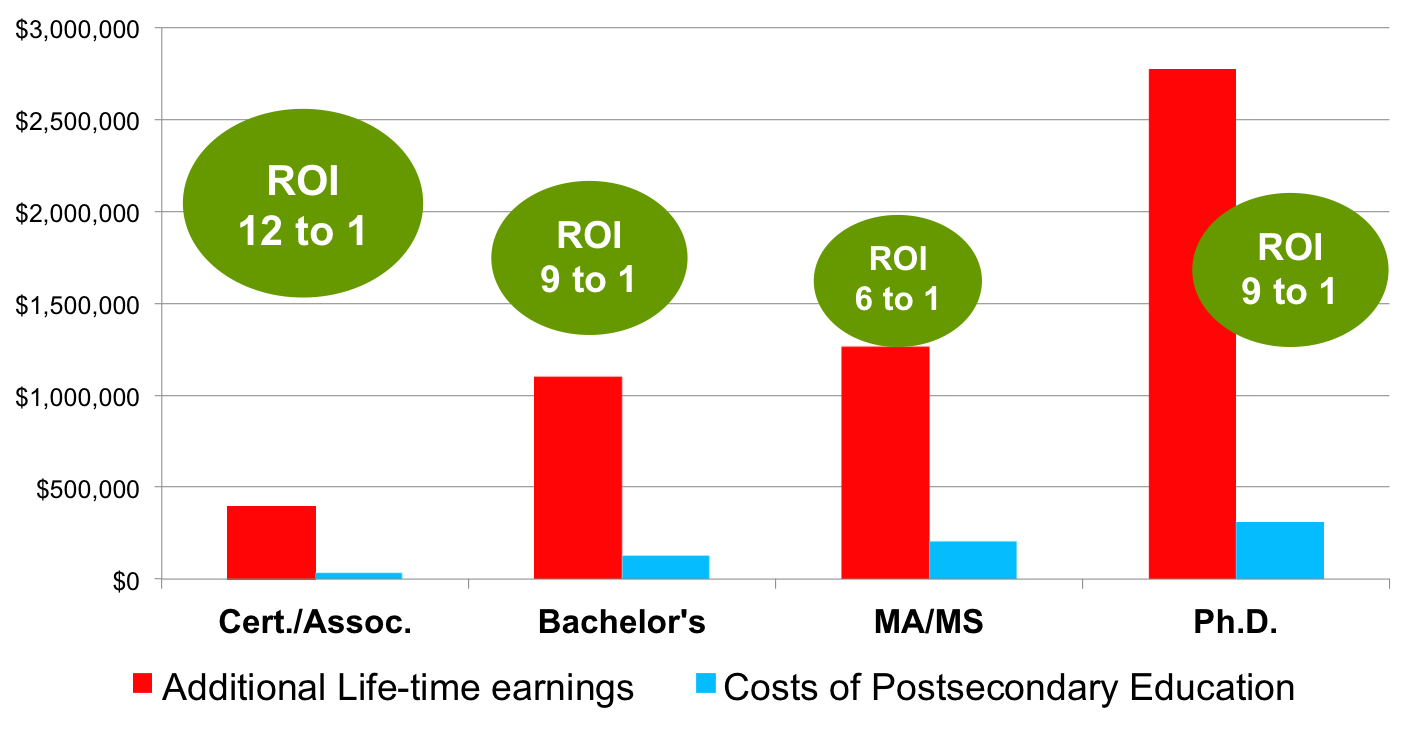
9th Grade
Here’s to new adventures.
We want to make sure you’re off to the strongest possible start. Focus on making the best grades you possibly can by studying hard and being prepared. Did you know taking part in extracurricular activities increases your chances of getting into college and other training opportunities after high school?
Start exploring now!
-
Talk about your interests and goals for the future.
Connect with people who can offer advice and help you make important decisions.
Start talking with your family about what you might want to do after graduation. Discuss your interests and the things you're good at. Talk to your friends about their goals and compare notes.
Next Steps
- Be sure to meet with your guidance counselor at least once this year so they know what you’re planning and can provide you the best help possible. Not sure what you should be discussing? Check out this Next Steps guide: Talking to Your Counselor – Questions to Consider in 9th, 10th & 11th Grade
- Make a point of talking to your family or a family friend about their career paths. Ask them how they ended up with the job they have now. Did they always know what they wanted to do? What training did they need? Tell them what you want for your future and ask for their advice.
- Pop into a career and technical classroom to ask the instructor questions about their program. Find out what kind of training opportunities and careers are available after high school.
-
Do all that you can to make good grades.
Schools start to calculate your grade point average (GPA) in 9th grade.
A bad semester can bring it down and a good semester can bring it up. You'll need to keep a close eye on your GPA from here on out. This means doing your best work in EVERY class, and asking for help when you need it.
Next Steps
- Know the minimum requirement. To give yourself the best chance at being accepted to an Idaho institution, you’ll need at least a 2.25 GPA.
- If your GPA is low, you’ll need to score higher on entrance exams to get into college.
- Learn how to develop good study habits and test-taking skills.
- Read as much as you can outside of class. Explore GoodReads “Popular 9th Grade Reading List” and make sure you’re challenging yourself with the right books. Read books about careers that interest you. For example, if you are considering healthcare, find a book about a famous american doctor or nurse.
-
Take classes that will count toward college and career.
Consider dual credit, advanced placement (AP), or technical competency credit opportunities that may be available to you in high school.
The state of Idaho may help pay for you to earn college credits or work towards a career and technical certification while you’re still in high school.
Next Steps
- Learn more about dual credit classes and other advanced opportunities.
- Ask your guidance counselor or career and technical instructors about advanced opportunities like technical competency credits that can help you get as much as a semester’s worth of credit at a technical college.
- Find out what computer classes are available at your high school. Most careers will require you to have at minimum some word processing, basic database, and spreadsheet abilities.
- Some high school programs take three years to complete and can lead to college credit, like information technology courses. Talk to your guidance counselor about pathway programs to make sure you get started in time.
-
Get involved in extracurricular activities.
There's more to life than just going to class and doing homework. Now that you're in high school, there are a ton of fun things you can do.
Joining a club or career technical organization, playing a sport, participating in a school play or volunteering at church—these all count toward becoming a well-rounded student, which will help when it's time to apply to school or seek out scholarships. Extracurricular activities also give you the chance to explore your interests and find out what you're good at. Perhaps you've already found your passion, or perhaps it's time to try something new!
Next Steps
- Visit the Idaho High School Activities Association website to learn more.
- Learn about the opportunities available through career and technical student organizations.
- Learn more about volunteer opportunities.
-
Seek out mentoring and support.
If you think you might be falling behind or you just need some extra guidance or encouragement, go after the help you need.
There are programs in Idaho to help students like you plan for the future.
Next Steps
-
Know the facts and explore your options.
Whatever your career and salary goals are, chances are they will require some education and training after high school.
People usually earn more based on how much education they've obtained beyond their high school diploma. If you start a job without additional training, it may be difficult to move up to a better position.
Next Steps
- Consider this: while your career goals might not be focused on earning lots of money, most college graduates earn twice as much in their lifetime as high school graduates.
- You usually will earn more based on how much additional education you have obtained beyond a high school diploma. To see just how much, check out this infographic from The Idaho State Board of Education.
- As you gain skills and experience throughout your career you’re likely move from job to job. Visit Career Atlas to get a feel for how different occupations are related.
-
Understand how to pay for college or additional training.
If you're planning on going to college or getting additional career training, you can definitely find a way to pay for it.
You just need to have a plan. And that plan starts now.
Next Steps
- You or your parents may want to consider opening an IDeal 529 savings account. These special accounts help you save and offer tax advantages that can help your money go further in paying for educational expenses.
- Consider taking a personal finance class at your high school. You will learn about student loans and basic financial management.
-
Get familiar with your choices—you've got more than one!
Now is the time to start exploring post-high school opportunities. The more you understand now, the easier it will be to make decisions as you get closer to graduating.
Life after high school might mean going to a four-year college, a technical college, or enrolling in a technical training program. The options below outline different paths you can consider.
Next Steps
- Apprenticeship – A modern registered apprenticeship program creates opportunities for companies to hire individuals, just like you, and train them to meet the specific requirements of the job. The benefit to the apprentice is that you are earning a paycheck while learning new skills. Learn more about apprenticeships in Idaho.
- Community college – Community college offers two-year associate degree programs and can help you get an affordable jump on a bachelor’s degree as well. These colleges usually have rolling admissions dates, so you don’t have to go right after high school.
- Four-year college – Colleges and universities generally offer bachelor’s degrees, master’s degrees and doctorate programs. If you’re thinking about going to college, now is a good time to start learning about what you might like to study, what you’ll need to know to get in, and how to finance your education.
- Military – There are four branches of the armed forces to consider joining. Each of them is tasked with different roles protecting our country. If you choose a military career, you’re certain to learn job skills that will help you in the workforce after you complete your service, or you may choose to stay in the military for your whole career. Based on your length of service and role, you may also qualify for grants to go to college once you complete your service.
- Technical college and Training/certification programs – Programs offered by these institutions usually last 1 to 2 years, prepare students for a specific field, and will result in a generally recognized certification. Examples include training for a job in nursing, robotics, diesel technology, or culinary arts.
- For an overview of all of these options, Explore Career and Technical Education (CTE) pathways. For more specific questions or to start planning your journey to career, contact a transition coordinator.
-
Study a little. Read a lot.
Next fall, you’ll have the opportunity to take the Preliminary SAT (PSAT) exam. You may want to set aside some time during the summer months to prepare, as the exam is offered in the fall semester.
Next Steps
- Ask your counselor for advice or materials to help you prepare for the PSAT exam.
- Prepare for the PSAT. Learn more about the test, review sample questions, and take practice tests.
- Check out this “Popular 10th Grade Reading List” and get a head start on your sophomore year reading. Read books about careers you may want to explore. For example, if you are interested in clothing design, read about famous designers.
